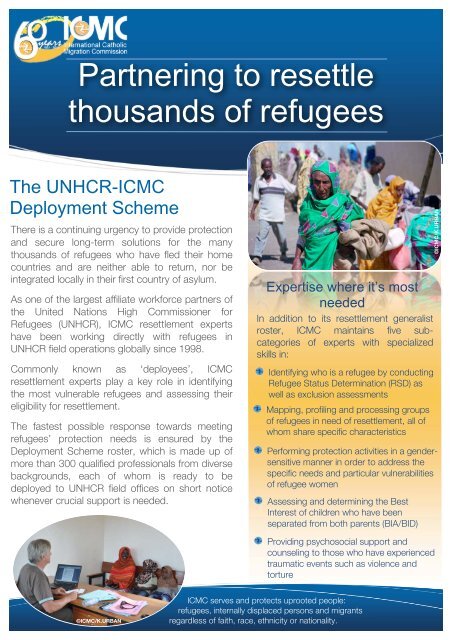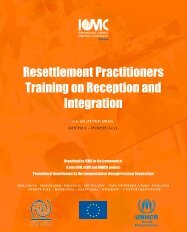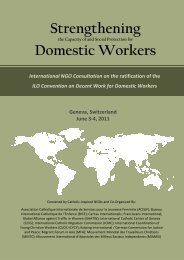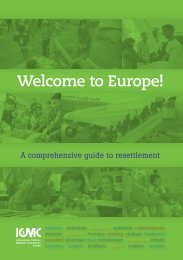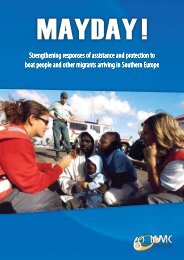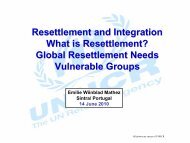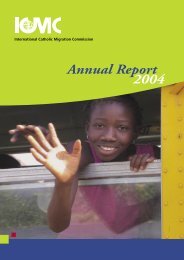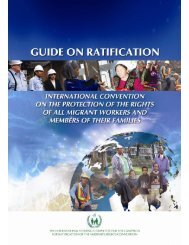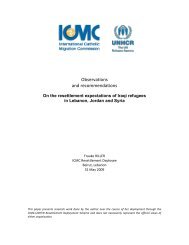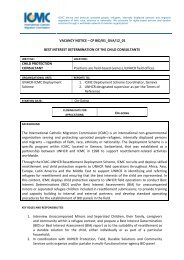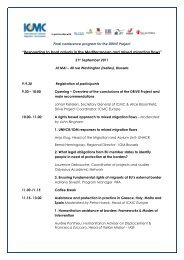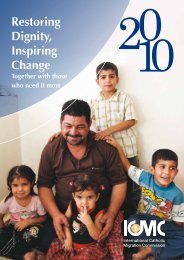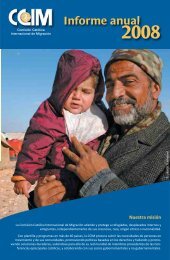Deployment Scheme Brochure 2011 - ICMC
Deployment Scheme Brochure 2011 - ICMC
Deployment Scheme Brochure 2011 - ICMC
Create successful ePaper yourself
Turn your PDF publications into a flip-book with our unique Google optimized e-Paper software.
Partnering to resettle<br />
thousands of refugees<br />
The UNHCR-<strong>ICMC</strong><br />
<strong>Deployment</strong> <strong>Scheme</strong><br />
<br />
There is a continuing urgency to provide protection<br />
and secure long-term solutions for the many<br />
thousands of refugees who have fled their home<br />
countries and are neither able to return, nor be<br />
integrated locally in their first country of asylum.<br />
As one of the largest affiliate workforce partners of<br />
the United Nations High Commissioner for<br />
Refugees (UNHCR), <strong>ICMC</strong> resettlement experts<br />
have been working directly with refugees in<br />
UNHCR field operations globally since 1998.<br />
Commonly known as ‘deployees’, <strong>ICMC</strong><br />
resettlement experts play a key role in identifying<br />
the most vulnerable refugees and assessing their<br />
eligibility for resettlement.<br />
The fastest possible response towards meeting<br />
refugees’ protection needs is ensured by the<br />
<strong>Deployment</strong> <strong>Scheme</strong> roster, which is made up of<br />
more than 300 qualified professionals from diverse<br />
backgrounds, each of whom is ready to be<br />
deployed to UNHCR field offices on short notice<br />
whenever crucial support is needed.<br />
Expertise where it’s most<br />
needed <br />
In addition to its resettlement generalist<br />
roster, <strong>ICMC</strong> maintains five subcategories<br />
of experts with specialized<br />
skills in:<br />
Identifying who is a refugee by conducting<br />
Refugee Status Determination (RSD) as<br />
well as exclusion assessments<br />
Mapping, profiling and processing groups<br />
of refugees in need of resettlement, all of<br />
whom share specific characteristics<br />
Performing protection activities in a gendersensitive<br />
manner in order to address the<br />
specific needs and particular vulnerabilities<br />
of refugee women<br />
Assessing and determining the Best<br />
Interest of children who have been<br />
separated from both parents (BIA/BID)<br />
©<strong>ICMC</strong>/K.URBAN<br />
Providing psychosocial support and<br />
counseling to those who have experienced<br />
traumatic events such as violence and<br />
torture<br />
©<strong>ICMC</strong>/K.URBAN<br />
<strong>ICMC</strong> serves and protects uprooted people:<br />
refugees, internally displaced persons and migrants<br />
regardless of faith, race, ethnicity or nationality.
Refugee resettlement: a valuable<br />
protection tool <br />
Resettlement is defined by<br />
UNHCR as the selection<br />
and transfer of refugees<br />
from a state in which they<br />
have initially sought<br />
protection to a third state,<br />
which has agreed to admit<br />
them – as refugees - with<br />
permanent resident status.<br />
Resettlement is one of<br />
three durable solutions that<br />
UNHCR is mandated to<br />
pursue. It is a fundamental<br />
protection tool and a form<br />
of international burden and<br />
responsibility sharing that, when used strategically, can<br />
benefit the entire refugee population.<br />
Of the 10.4 million refugees worldwide in 2010, UNHCR<br />
estimated some 800,000 people worldwide to be in need<br />
of resettlement, including populations for whom<br />
resettlement is envisioned over a period of several years.<br />
However, only 10 in every 100 refugees needing<br />
resettlement are actually resettled each year.<br />
The largest resettlement country is the USA, followed by<br />
Australia and Canada. Countries in Europe and Latin<br />
America are also making a smaller, but increasing,<br />
number of resettlement places available for refugees.<br />
©<strong>ICMC</strong>/K.URBAN<br />
Identifying those in need<br />
of resettlement<br />
<strong>ICMC</strong> resettlement experts<br />
possess a strong understanding of<br />
the international protection<br />
framework; have excellent<br />
interviewing and analytical skills<br />
and are deeply committed to<br />
working with the most vulnerable<br />
displaced populations globally,<br />
often in remote and isolated<br />
locations.<br />
While the number of deployments<br />
carried out on an annual basis<br />
varies according to resettlement<br />
needs, <strong>ICMC</strong> has facilitated more<br />
than 850 deployments to UNHCR<br />
field operations since the <strong>Scheme</strong><br />
was initiated in 1998.<br />
Currently, the highest<br />
concentration of <strong>ICMC</strong> deployees<br />
is in Africa and the Middle East,<br />
with deployments also taking<br />
place in Asia, Europe and Latin<br />
America.<br />
Boosting capacity to refer refugees for resettlement<br />
In 2010, 55,825 refugees<br />
were put forward by <strong>ICMC</strong><br />
deployees for resettlement<br />
consideration, contributing<br />
significantly to the total of<br />
105,066 persons submitted<br />
by UNHCR to resettlement<br />
countries over the course of<br />
the year.<br />
23,765<br />
54,780 55,825<br />
2008 2009 2010<br />
Number of refugees referred by <strong>ICMC</strong> deployees to UNHCR for resettlement consideration
Understanding the past flight, present<br />
vulnerabilities and future prospects of<br />
refugees<br />
A deployee’s work involves a broad range of skills and<br />
activities, including identifying survivors of violence and<br />
torture, women at risk and other highly vulnerable<br />
refugees. Deployees interview refugees to assess their<br />
eligibility and whether resettlement is the most<br />
appropriate solution for their particular case. Based on<br />
their analysis, deployees then complete detailed referral<br />
forms for submission of resettlement cases.<br />
In addition, deployees may be called upon to conduct<br />
Refugee Status Determination assessments or to<br />
undertake Best Interest Determinations for<br />
unaccompanied or separated children. Oftentimes,<br />
deployees are involved in the broader resettlement<br />
process, working in tandem with embassies,<br />
governments, and national and international<br />
organizations to ensure the effective implementation of<br />
resettlement operations.<br />
This Congolese husband and wife were separated<br />
from their families when they fled their homeland as<br />
children. They met, married and started a family of<br />
their own during their many years living as refugees<br />
in a camp.<br />
With no possibility to return home or to stay longterm<br />
in their first country of asylum, the family was<br />
interviewed for resettlement by an <strong>ICMC</strong> deployee<br />
and their case was submitted and accepted by the<br />
USA. They are now resettled in Portland, Oregon.<br />
©<strong>ICMC</strong>/B.HAMCHA<br />
“The best part of deployment for me is<br />
the opportunity to go to the camps,<br />
interview refugees who have lost<br />
everything, including the hope of a<br />
better life, and be able to make a real<br />
difference”<br />
Bahia Hamcha<br />
<strong>ICMC</strong> Deployee<br />
Deployed to Tanzania (2009), Sudan (2010),<br />
Kenya (2010), Egypt (<strong>2011</strong>)<br />
©<strong>ICMC</strong>/B.HAMCHA<br />
Making a difference<br />
<strong>ICMC</strong> deployees play a crucial role in<br />
protecting vulnerable refugees, giving<br />
them hope for a new beginning. One<br />
woman, who was pregnant when<br />
<strong>ICMC</strong> deployee Bahia Hamcha<br />
interviewed her family, was so<br />
touched that she ultimately decided to<br />
name her daughter after Bahia.<br />
The mother’s case was submitted and<br />
accepted by the USA and the family—<br />
including baby Bahia—has since been<br />
resettled to Portland, Oregon.
Behind the scenes<br />
Day-to-day operations of the <strong>Deployment</strong> <strong>Scheme</strong><br />
are managed by a small team of dedicated support<br />
staff from <strong>ICMC</strong> Headquarters in Geneva,<br />
Switzerland. <strong>ICMC</strong> is responsible for the<br />
management and administration of the <strong>Deployment</strong><br />
<strong>Scheme</strong>, from the identification and recruitment of<br />
qualified staff to their successful deployment to<br />
UNHCR field operations, as well as monitoring and<br />
reporting on all deployee activities in the field.<br />
Beyond the <strong>Deployment</strong> <strong>Scheme</strong><br />
In addition to the registration and referral of<br />
refugees, <strong>ICMC</strong>’s Resettlement Support Center<br />
(RSC) in Turkey further assists refugees in need of<br />
resettlement by preparing their cases for<br />
submission to the United States and facilitating<br />
pre-departure processes, such as cultural<br />
orientation sessions and medical examinations.<br />
Together with the International Organization for<br />
Migration (IOM) and UNHCR, <strong>ICMC</strong> also seeks to<br />
build capacity and promote refugee resettlement in<br />
Europe by strengthening the engagement of<br />
European Union Member States.<br />
Working directly with migrants and refugees in<br />
more than 40 countries around the world, <strong>ICMC</strong><br />
has been responding to the needs of people on<br />
the move since 1951. <strong>ICMC</strong> Headquarters are<br />
located in Geneva, Switzerland, and are further<br />
supported by the work of liaison offices in Brussels<br />
(<strong>ICMC</strong> Europe) and Washington, D.C (<strong>ICMC</strong>, Inc.)<br />
and field offices located in Greece, Indonesia,<br />
Jordan, Malaysia, Pakistan and Turkey.<br />
<strong>ICMC</strong> wishes to thank UNHCR for the financial<br />
support and the long-standing partnership in the<br />
joint effort to find durable solutions for refugees.<br />
<strong>ICMC</strong> welcomes interest from other donors who<br />
may be able to support additional efforts to<br />
address the needs and improve the lives of some<br />
of the world’s most vulnerable people.<br />
Dedicated to refugee<br />
protection <br />
The UNHCR-<strong>ICMC</strong> Resettlement<br />
<strong>Deployment</strong> <strong>Scheme</strong> provides resettlement<br />
experts with the opportunity to make a<br />
positive impact on the lives of refugees.<br />
Resettlement experts who are recruited to<br />
the roster are available at short notice and<br />
for a minimum period of 3 months.<br />
With each request for additional support at<br />
a UNHCR field office, <strong>ICMC</strong> matches the<br />
expertise of roster members with the<br />
specific skills and experience required for<br />
the particular deployment.<br />
Deployees may complete an unlimited<br />
number of deployments, however, the<br />
maximum period allowed at any single duty<br />
station is 24 months.<br />
For further information on how to apply,<br />
including full eligibility requirements and to<br />
download the required application forms<br />
please visit www.icmc.net<br />
©<strong>ICMC</strong>/K.URBAN<br />
1 rue de Varembé, Case Postale 96, 1211 Geneva 20, Switzerland<br />
Tel: +41 (0) 22 919 10 20, Fax: +41 (0) 22 919 10 48,<br />
Email: info@icmc.net, www.icmc.net


